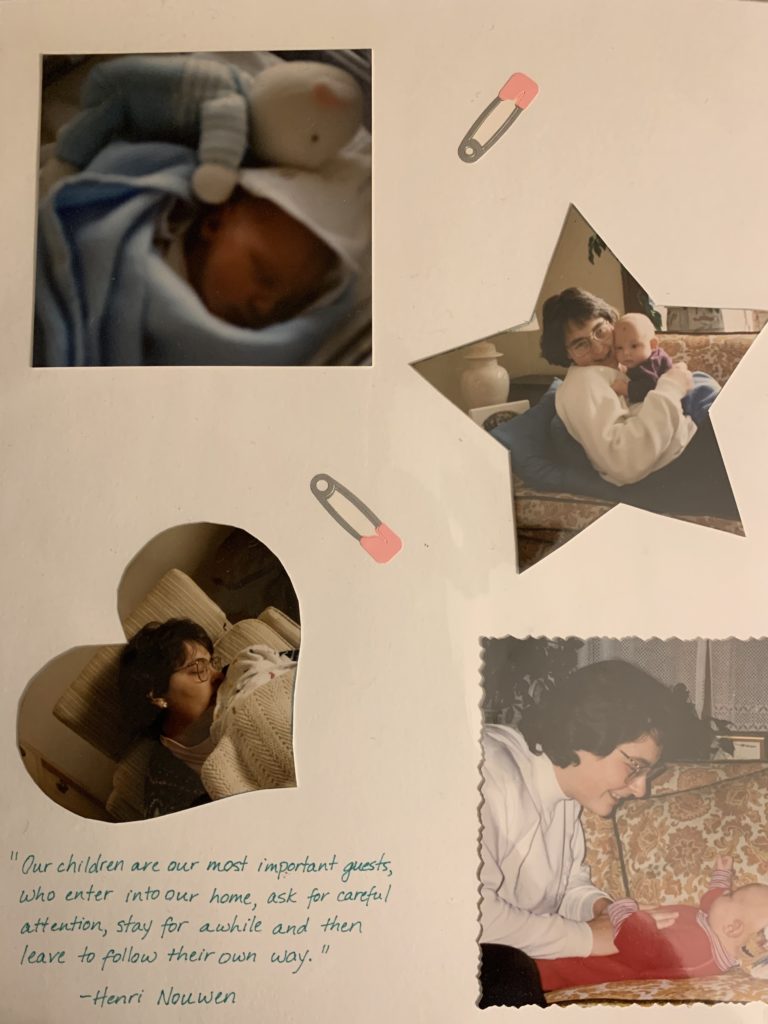“How did you decide to become a midwife?”
This is a common question folks ask me when they interview me. My story details how I was drawn to birth work from a young age, acting out giving birth to my dolls, and then breastfeeding them. Birth work called to me, even more, when I started navigating my own childbearing journey.
My eldest recently celebrated his 27th birthday (27! Am I really old enough to have a 27-year-old son?). I think often about the first time mother I was then. Curating a large stack of books from my local library, I devoured all the information I could about pregnancy, birth, and caring for a new baby. I wanted to:
- labor and give birth without pain medications if I could.
- avoid induction because I understood that it more frequently led to surgical birth.
- skip long monitoring on the machines, IVs, medications, and episiotomy.
- keep my baby skin to skin with me.
- have his cord clamped and cut only after he had received his full cord blood transfusion.
- breastfeed exclusively.
Most importantly, I wanted to feel like I was making my own choices for my family
My care providers behaved respectfully and professionally, even when my detailed birth plan challenged many of the standard protocols. The birth did progress without pain medications, and my baby was born vaginally.
But many things happened that I had wanted to avoid.
Nurses started an IV immediately upon my arrival at the hospital. Multiple nurses made several attempts to insert the IV. At one point, a large fluid bubble appeared on my hand before the nurse noticed and removed the needle. The staff insisted on using the external monitor extensively, and my mobility was limited because of the IV and the monitor.
An internal probe monitored my baby’s heart rate. It was inserted into the skin on his scalp, leaving a small wound. The doctor had discussed internal monitoring, and my husband and I had both clearly declined it. Then, in the middle of a contraction, the doctor asked my husband to go and fetch the nurse, and by the time he came back, she had inserted the probe against our expressly stated wishes.
Even way back then, we could call the nurses with a button from the room.
The doctor cut an episiotomy to facilitate the birth of my tiny, 5# 15oz baby. She sutured in such a way that left raw tissue exposed. Sitting was problematic for many days afterward and I experienced pain often for my baby’s first year of life.
My baby was taken away from me and put in a nursery with no clear indication and against my wishes. Staff fed him bottles of sugar water, and a pacifier in the nursery, all things I wanted to avoid in order to optimize breastfeeding.
Breastfeeding was challenging for me, and we only had one successful feeding in a three-day hospital stay. Nurses, family members, and friends told me that bottles were fine, and I shouldn’t try to be a martyr by breastfeeding. Some people even suggested that breast milk could hurt my baby.
I left the hospital feeling many things
- exhausted
- love for my baby and my husband
- grief for the things that had happened to us in the process of being born and giving birth
- pain and discomfort in my body
I was overwhelmed at the responsibility of caring for a helpless little person and I felt incompetent to do so. Everything I thought I had wanted up until that point had been questioned, second-guessed, and over-ridden. I distinctly remember a brief panic when I thought, “Why are they sending me home with this baby? I have no idea what I’m doing!”
Where I’d felt confident and self-assured going into the hospital, I felt overwhelmed and sad coming out.
Since that experience, I’ve worked for better experiences for families. I taught childbirth classes to share information about how to navigate the care and advocate for evidence-based and compassionate care. Working as a labor and birth doula, I supported families in this critical transition time. And finally, I became a midwife to offer the kind of family-centered care I wished for when my baby came 27 years ago.
While lots of first time parents are different from who I was as a new mother, it seems true that most first time parents are thrilled and scared in about equal measure.
All new families need to feel heard and respected for their choices and decisions about pregnancy, birth and parenting their new babies.
I’m incredibly grateful for the hundreds of families who have put their trust in me to be a guide, mentor, coach, care provider, and sometimes just a caring person with a large stash of tissues. I would be honored to be a small part of your story about how you became a parent.
I’d love to hear your powerful stories. . .



